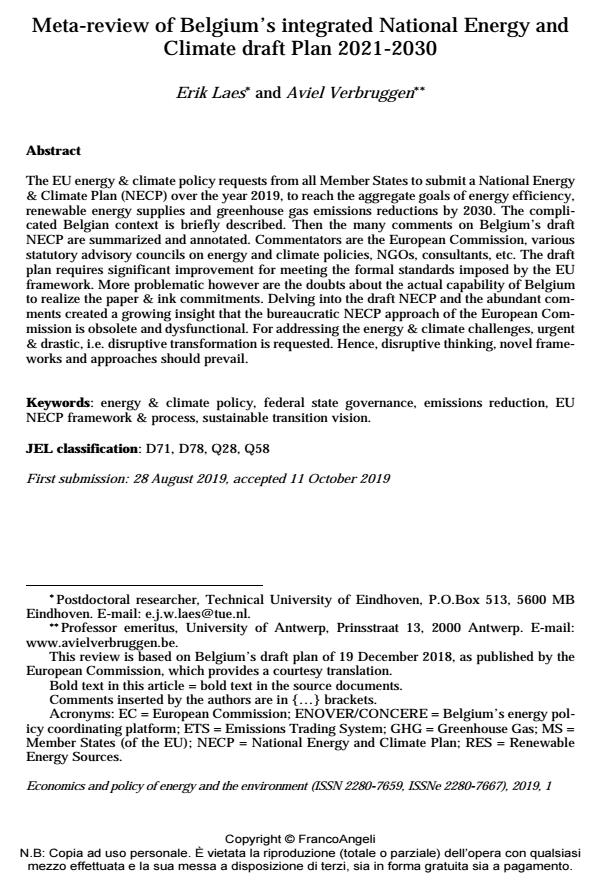Meta-review of Belgium’s integrated National Energy and Climate draft Plan 2021-2030
Titolo Rivista ECONOMICS AND POLICY OF ENERGY AND THE ENVIRONMENT
Autori/Curatori Erik Laes, Aviel Verbruggen
Anno di pubblicazione 2019 Fascicolo 2019/1 Lingua Inglese
Numero pagine 16 P. 57-72 Dimensione file 208 KB
DOI 10.3280/EFE2019-001004
Il DOI è il codice a barre della proprietà intellettuale: per saperne di più
clicca qui
Qui sotto puoi vedere in anteprima la prima pagina di questo articolo.
Se questo articolo ti interessa, lo puoi acquistare (e scaricare in formato pdf) seguendo le facili indicazioni per acquistare il download credit. Acquista Download Credits per scaricare questo Articolo in formato PDF

FrancoAngeli è membro della Publishers International Linking Association, Inc (PILA)associazione indipendente e non profit per facilitare (attraverso i servizi tecnologici implementati da CrossRef.org) l’accesso degli studiosi ai contenuti digitali nelle pubblicazioni professionali e scientifiche
The EU energy & climate policy requests from all Member States to submit a National Energy & Climate Plan (NECP) over the year 2019, to reach the aggregate goals of energy efficiency, renewable energy supplies and greenhouse gas emissions reductions by 2030. The complicated Belgian context is briefly described. Then the many comments on Belgium’s draft NECP are summarized and annotated. Commentators are the European Commission, various statutory advisory councils on energy and climate policies, NGOs, consultants, etc. The draft plan requires significant improvement for meeting the formal standards imposed by the EU framework. More problematic however are the doubts about the actual capability of Belgium to realize the paper & ink commitments. Delving into the draft NECP and the abundant comments created a growing insight that the bureaucratic NECP approach of the European Commission is obsolete and dysfunctional. For addressing the energy & climate challenges, urgent & drastic, i.e. disruptive transformation is requested. Hence, disruptive thinking, novel frameworks and approaches should prevail.
Keywords:Energy & climate policy, federal state governance, emissions reduction, EU NECP framework & process, sustainable transition vision.
Jel codes:D71, D78, Q28, Q58
- EC (2019c). Commission Recommendation of 18.6.2019 on the draft integrated National Energy and Climate Plan of Belgium covering the period 2021-2030. C(2019) 4401 final. Brussels, 18.6.2019.
- FRDO (2019). Advies van de FRDO over het ontwerp van Nationaal Energie Klimaat Plan 2030 (NEKP). Brussels, 10.5.2019.
- Haas T. (2019). Struggles in European Union Energy Politics: A Gramscian Perspective on Power in Energy Transitions. Energy Research & Social Science 48 (February): 66-74.
- IEA (2016). Energy policies of IEA countries: Belgium 2016 review. Paris: OECD/IEA.
- Laes E., Lodewijks P., Renders N., Vanhulsel M., Vingerhoets P., Goossens J. and Ooms, K. (2018). Milieuverkenning 2018: Achtergronddocument Oplossingsrichtingen voor het energiesysteem -- available at: https://www.milieurapport.be/publicaties/2018/milieuverkenning/milieuverkenning-2018-oplossingsrichtingen-voor-het-energiesysteem.
- NBB (2019a). Regionale Rekeningen 2017. Instituut voor de nationale rekeningen. Nationale
- Bank van België. NBB (2019b). Nationale rekeningen. Eerste raming van de jaarlijkse rekeningen 2018.
- Instituut voor de nationale rekeningen. Nationale Bank van België.
- Stern N. (2006). The Economics of Climate Change: The Stern Review. Her Majesty’s Treasury, UK Government.
- Vandendriessche F. (2017). Energierecht in België en Vlaanderen. Gent: Larcier.
- Van de Graaf T., Laes E., Verbruggen A. (2019). Energy Governance in Belgium, forthcoming in Knodt M., Kemmerzell J. (eds.). Handbook of Energy Governance in Europe. Berlin: Springer.
- Van Steenberghe V. (2019). Climate policies and the low carbon transition in Belgium. Belgian Federal Public Service Health, Food Chain Safety and Environment, 25.2.2019 -- available at: https://www.epocbelgium.be/sites/epocbelgium.be/files/documents/3_international_climate_policies_and_the_impact_on_the_belgian_level_vincentvan_steenberghe.pdf.
- Verbruggen A. (1995). Environmental policy planning: experience from Flanders. European Environment, 5: 39-44.
- Verbruggen A., Di Nucci M.R., Fischedick M., Haas R., Hvelplund F., Lauber V., Lorenzoni A., Mez L., Nilsson L.J., del Rio Gonzalez P. Schleich J., Toke D. (2015). Europe’s electricity regime: restoration or thorough transition. International Journal of Sustainable Energy Planning and Management, 5: 57-68.
- Volberda H.W., Morgan R.E., Reinmoeller P., Hitt M.A., Ireland R.D., Hoskissen R.E. (2011). Strategic Management: Competitiveness and Globalization (Concepts and Cases). Cengage Learning EMEA.
- VROM (1989). To Choose or to Lose. SDU Uitgeverij, ‘s Gravenhage.
- Winsemius P. (1987). Gast in eigen huis. Beschouwingen over milieumanagement. Samson H.D. Tjeenk Willink, Alphen aan den Rijn
- Cherp A., Vinichenko V., Jewell J., Brutschin E. and Sovacool B. (2018). Integrating technoeconomic, socio-technical and political perspectives on national energy transitions: A meta-theoretical framework. Energy Research & Social Sciences, 37: 175-190.
- Climact ecologic (2019). Planning for net zero: Assessing the Draft National Energy and Climate Plans. Report commissioned by the European Climate Foundation. May 2019.
- Climate Market Watch and Transport & Environment (2017). EU Climate Policy Leader Board. Policy Briefing -- available at: https://carbonmarketwatch.org/wp-content/uploads/2017/03/EU-Climate-Leader-Board-Where-countries-stand-on-the-Effort-Sharing-Regulation-–-Europe’s-largest-climate-tool_final.pdf.
- EC (2017). Energy Union Factsheet Belgium. Third Report on the State of the Energy Union.
- Commission Staff Working Document SWD(2017) 285 final.
- EC (2019a). Summary of the Commission assessment of the draft National Energy and Climate Plan 2021-2030. Brussels, 18.6.2019.
- EC (2019b). Assessment of the draft National Energy and Climate Plan of Belgium. Commission Staff Working Document SWD(2019) 211 final. Brussels, 18.6.2019.
- European roadmaps to achieving 2030 renewable energy targets Giacomo Di Foggia, Massimo Beccarello, in Utilities Policy 101729/2024 pp.101729
DOI: 10.1016/j.jup.2024.101729 - Review of Energy and Climate Plans of Baltic States: The Contribution of Renewables for Energy Production in Households Dalia Streimikiene, Grigorios L. Kyriakopoulos, Gintare Stankuniene, in Energies /2022 pp.7728
DOI: 10.3390/en15207728
Erik Laes, Aviel Verbruggen, Meta-review of Belgium’s integrated National Energy and Climate draft Plan 2021-2030 in "ECONOMICS AND POLICY OF ENERGY AND THE ENVIRONMENT" 1/2019, pp 57-72, DOI: 10.3280/EFE2019-001004